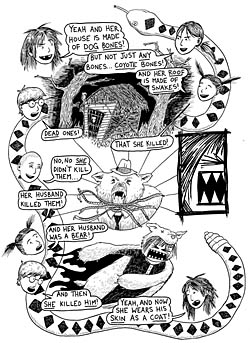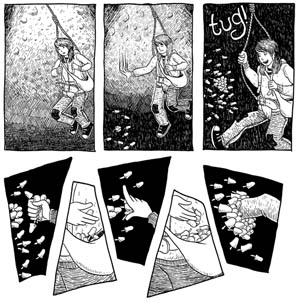 By Liz Baillie
By Liz Baillie
96 pages, black and white
Published by Punchbuggy Press
When handled properly, a story that quietly shifts genres can be a real delight. That’s definitely the case with Liz Baillie’s Freewheel, which on the surface looks strictly to be a human drama, about a girl who runs away from her foster mother to try and find her missing brother and in the process discovers an underground network of homeless people. One of the many things that’s great about Freewheel, though, is how halfway through the first volume it quietly switches up on your expectations and adds a whole new dimension to its story.
 Shifting genres on your reader doesn’t always work out so well. Having a literal monster show up at the eleventh hour of a psychological thriller is usually a fast way to get your audience hurling your book across the room, to use one tired example that shows up all too often. In the case of Freewheel, though, its fantastical element appears at a perfect moment. It’s already a tense moment for Jamie, getting lowered into a cave in search of mushrooms she needs to use as a bribe to get help locating her brother. She’s been warned of the darkness within the cave, something that up until now she’s blown off. And then, as she starts reaching for the mushrooms, something else reaches back. It’s a perfect "gotcha!" moment, with the reader suddenly understanding that all the warnings were not overblown or exaggerated.
Shifting genres on your reader doesn’t always work out so well. Having a literal monster show up at the eleventh hour of a psychological thriller is usually a fast way to get your audience hurling your book across the room, to use one tired example that shows up all too often. In the case of Freewheel, though, its fantastical element appears at a perfect moment. It’s already a tense moment for Jamie, getting lowered into a cave in search of mushrooms she needs to use as a bribe to get help locating her brother. She’s been warned of the darkness within the cave, something that up until now she’s blown off. And then, as she starts reaching for the mushrooms, something else reaches back. It’s a perfect "gotcha!" moment, with the reader suddenly understanding that all the warnings were not overblown or exaggerated.
What’s nice is that from there, Baillie continues to keep the fantastical elements present, but never in an overwhelming manner. When Jamie visits the Contessa, it’s in a surreal sequence that unfolds around Jamie. Just like the darkness reaching out to grab the unwary Jamie, it’s a moment that can initially be viewed as only in Jamie’s head, but one that rapidly asserts itself as true reality. But for each of these fantastical moments, Baillie never loses track of Jamie’s desire to find her missing brother, and her general sense of being lost in a world that has suddenly grown quite a bit in size around her. It’s adventure, it’s family, it’s fantasy, it’s all of the above. Freewheel is a story that quickly stakes out its own unique take on the world around it and makes it memorable and enticing.
 Baillie’s art goes a long way towards bringing Freewheel to life as well. Baillie packs a lot of detail into her backgrounds, from lush fields of grass, to the grain on tree trunks. It’s important to make Freewheel‘s world of hidden tree-top camps to feel natural, and Baillie pays attention to everything, from ropes and pulleys to columns of gently swaying hammocks. All this isn’t to say that Baillie neglects her characters, though. I love the thick mop of hair that Baillie draws on Jamie, and how it frames her worried face. And with Freewheel having a varied and odd cast of characters, Jamie often gets to look like the "normal" one among the rag-tag crowds; it’s a nice contrast, letting her stand out among them all. My favorite part of the art, though, is when Baillie lets her art twist and turn around the page, as different characters weigh in on a subject. It’s a perfect symbol for the way that people’s stories jump from one subject to the next, and it’s a nice visual break into something different for a page or two. Baillie resists the urge to overuse the technique, so it still feels nice and fresh.
Baillie’s art goes a long way towards bringing Freewheel to life as well. Baillie packs a lot of detail into her backgrounds, from lush fields of grass, to the grain on tree trunks. It’s important to make Freewheel‘s world of hidden tree-top camps to feel natural, and Baillie pays attention to everything, from ropes and pulleys to columns of gently swaying hammocks. All this isn’t to say that Baillie neglects her characters, though. I love the thick mop of hair that Baillie draws on Jamie, and how it frames her worried face. And with Freewheel having a varied and odd cast of characters, Jamie often gets to look like the "normal" one among the rag-tag crowds; it’s a nice contrast, letting her stand out among them all. My favorite part of the art, though, is when Baillie lets her art twist and turn around the page, as different characters weigh in on a subject. It’s a perfect symbol for the way that people’s stories jump from one subject to the next, and it’s a nice visual break into something different for a page or two. Baillie resists the urge to overuse the technique, so it still feels nice and fresh.
Freewheel has new pages of art three times a week at freewheelcomics.com, but when there was a chance to advance order a copy of the print edition I jumped at the chance. This is a blast and a half to read, and I like having a print edition ready for re-reading at a moment’s notice. Check out the online pages for free, and trust me, you’ll be ready to buy a copy as well by the time you’re done. (As an added bonus, the print edition goes farther than the web comic has currently arrived at.) Check it out.
Purchase Links: Amazon.com | Powell’s Books
